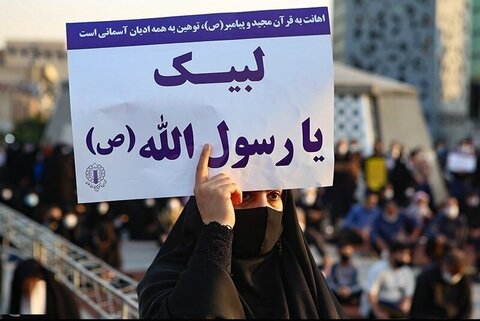Hawzah News Agency (Qom, Iran) – Qom seminary scientific associations in a statement condemned the insult to the Prophet Muhammad (PBUH), The text of this statement is as follows:
In the name of Allah, the all-compassionate the most merciful
لَقَدْ جَاءَكُمْ رَسُولٌ مِّنْ أَنفُسِكُمْ عَزِيزٌ عَلَيْهِ مَا عَنِتُّمْ حَرِيصٌ عَلَيْكُم بِالْمُؤْمِنِينَ رَءُوفٌ رَّحِيمٌ
There has certainly come to you an apostle from among yourselves. Grievous to him is your distress; he has a deep concern for you and is most kind and merciful to the faithful.
(The glorious Qur'an 9:128)
Once again, the insult to the Prophet of Mercy; Mohammad (peace be upon him and his household) occurred in France, and the support of the French President for this evil deed under the pretext of defending the freedom of expression has caused deeper regrets.
This insult and the subsequent political support {by the French government} occurred, while according to various international docs, the prohibition of insulting religious sanctities, especially the Holy Prophets, is so obvious that one cannot ignore hurting the feelings of hundreds of millions of Muslims and free people under the pretext of freedom of expression.
Many human rights instruments such as the Universal Declaration of Human Rights and the Covenants, freedom, including freedom of expression, has not declared absolutely free but it is actually restricted to some extent. There are frameworks within which Freedom of expression could be practiced such as public order, liberty of others, the dignity of others, public morality, etc. Article 29 of the Universal Declaration of Human Rights, Article 8 of the International Covenant on Economic, Social and Cultural Rights, Article 12 of the International Covenant on Civil and Political Rights, are applied within the framework of the principle of the rule of law, therefore cannot be relied on to apply absolute freedom of expression.
These restrictions, especially on the principle of freedom of expression, are specified in documents such as Article 19 of the Covenant on Civil and Political Rights along with the principle of responsibility. Such restrictions are even specified in Article 10 of the European Convention on Human Rights. Respect for religions and the maintenance of respect for religious believers and the prohibition of religious hatred are mentioned in various resolutions, such as the Human Rights Council resolutions on "insulting religions" in 1999 therefore, in addition to human, moral and religious principles, according to international law, the prohibition of insulting is an exception to the principle of freedom of expression. On this basis, it is not possible to insult the Prophet Mohammad (PBUH), who is the most beloved and holy prophet among Muslims, under the pretext of freedom of expression.
Religious incitement and religious hatred have long been a tool for Islamophobia for some Western countries but undoubtedly, Muslims around the world will not allow such a wave to be moved by the Western claimants of freedom, besides that these movements cannot stop the spread of Islam among free people with a clear conscience.
While condemning this immoral and inhumane act and the hate speech of the President of France, Qom seminary scientific associations expect the scientific and religious assemblies of the world, especially European countries, and France, to consider human values as well as legal rules and international documents and condemn these shameless acts, and while considering the guarantee of the implementation of the international law system in preventing and confronting such evil acts as insufficient and ineffective, call for the legal and political pursuit of this issue in the international assemblies.
Qom Seminary Scientific Associations
31/Oct/2020

